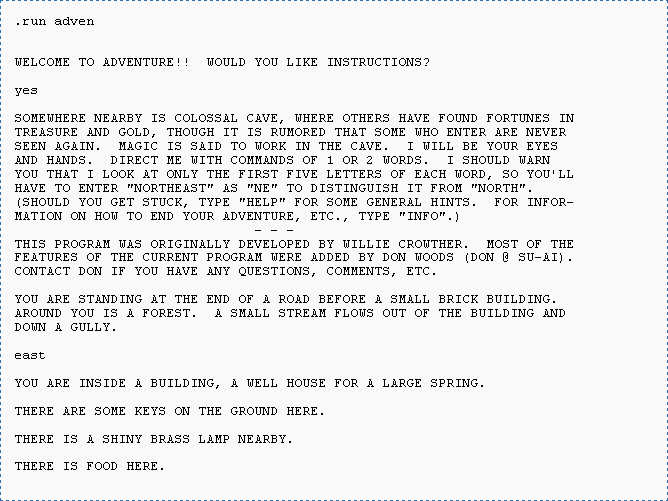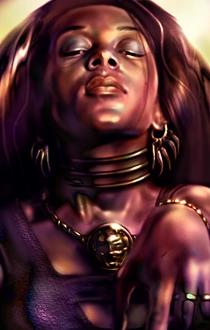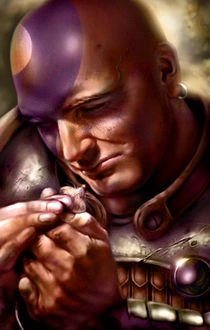A long time ago, I played a video game on a teletype machine.
During the summer after my 5th and 6th grade years, the younger brother of a neighbor would visit from New York City for a few months. While he was a year older than me, his sister was significantly older than him, as she was married with a toddler. I suppose geeks recognize each other, no matter where they're from, and he and I became fast friends. While I was reading Lord of the Rings, The Sword of Shannara, and The Belgariad, he was reading Dune and X-Men. He introduced me to the Elfquest comics, which were unlike anything I'd seen before then.* We'd often take bike rides down to the local strip mall to spend a few hours playing video games wherever they could be found, or we'd spend time playing with his brother-in-law's Atari 2600 and collection of games.
One day, I stopped by their house to find him sitting at the dining room table with what looked like an electronic typewriter in front of him. As both his sister and her husband worked --and his nephew was in daycare-- he was frequently alone for the day. But what surprised me was that he wasn't reading or playing around with the Atari**.
"Hey, you have to see this," he said as he pulled me upstairs and sat me down in front of the machine. It looked like an electronic typewriter, much fancier than the manual or IBM Selectric typewriters I'd been exposed to before now, only that it printed on rolls of thermal paper.
"It's a typewriter," I finally replied.
"No, it's a computer."
I raised an eyebrow.
"Okay, it's not a computer by itself, it connects to a computer over the phone."
"What do you do with it?"
"You can do stuff with it, like play games."
That caught my attention. "What sort of games?"
"An adventure game."
"Oh? Can you show me?"
He shuffled his feet. "It costs money to connect, so I'm only allowed to play for an hour. Okay?"
"Got it."
Reaching across me, he flipped on the power switch and typed in a command he'd written down on a pad of paper next to the machine. I heard a screeching sound, an electronic "bounce bounce", and then the machine sprang to life, printing out a "Connected" onto the roll of thermal paper.
"Now, we do this...." he typed in the command "adventure" and suddenly the following popped out:
 |
From the wikipedia page. I finally gave up
after spending a few hours trying to find the roll
of paper I kept from that session. |
Now, I have to explain that this was before my exposure to Dungeons and Dragons; this was sometime in the Summer of '81, and I was first introduced to D&D in the Fall of '81. I knew and loved the Atari 2600 game Adventure, even though the "dragons" looked a lot like ducks.***
 |
The player, carrying a sword, having just slain
the green dragon.
From defunctgames.com. |
Still, the concept of a written adventure game, where you can interact with a computer just like you were writing your own novel, was amazing to me.
I quickly discovered that what I thought were some pretty basic ideas, such as "cage bird", got me a "What do you want to do with the cage?"**** The words "kill snake" resulted in "Attacking the snake both doesn't work and is very dangerous."
"Aaargh," I grumbled. "It's not doing what I want to do! Why won't it just capture the bird?"
"Yeah, my friend replied. "I've found that a problem too."
Due to our scattershot attempts to figure out how to get the bird in the cage, bypass the snake, and then not get killed by the dwarf (trust me, this makes sense in the context of the game), that hour passed by very quickly.
My friend reached over and turned the teletype machine off.
"Oh man," I pleaded, "another five minutes?"
"Um," he began, and looked at the gigantic pile of paper that we had hanging off the machine.
"Oh. Whoops."
"Yeah," he replied. "I think I'm in trouble."
He ended up getting grounded for a few days because of all of the paper that we used up, not to mention that he'd already played for an hour before I got there, so we technically played an hour longer than he was supposed to play. But I did get to keep the roll of paper, so somewhere around the house is a record of that game session, my first true adventure game session.
***
I bring this up because I've been reading a book titled
A History of Video Games in 64 Objects by Jon-Paul C. Dyson and Jeremy K. Saucier, who founded the World Video Game Hall of Fame out of The Strong Museum of Rochester, New York. The 64 objects in question stretch from the precursors of video games up through the present (yes, including Pokemon GO), but for me the objects of greatest interest were from the early days of video games.
 |
The cover may not look
like much, but it's a fascinating
read. From Amazon. |
The book didn't include Colossal Cave, but it was referenced in a couple of the articles, especially the one about Zork. Making an engaging game utilizing the 70s era tech --or, in the case of Pong, essentially 50s era tech-- was amazing. The genius behind those games, forging ahead into the unknown and creating the modern software industry along with Lotus, Oracle, IBM, and other heavyweights of IT, can often be obscured when looking at those days from our current perch: an era of smartphones, VR, and multiplayer online games. There's more power in my 4-5 year old smartphone than can be found in the cutting edge Athlon PC I had back in 1999, and the amount of computing power that these early video games consumed is infinitesimal by comparison. But what they lacked in pure computing power they made up for in cleverness and replayability.
Sure, when you finish a game like Colossal Cave or Zork, the game is over, but so many games of that era utilized randomization to an extent that no replays were ever the same again. You select the third option on Atari's Adventure, and you're never sure where all of the pieces are. Hell, you may even end up in an impossible victory condition, because the lack of computing space meant that the developers of Adventure couldn't spend precious lines checking to see if you could actually access some of the areas where the items were hidden. But far from it being merely a "feature" of the game, it meant that there were going to be times when you simply couldn't win. To a player now used to customizing D&D encounters and devs constantly tweaking raid and instance bosses in MMOs, the concept of "sometimes you just won't win" is pretty alien. And also refreshing.
I remember playing Santa Paravia --an early country simulator game-- back in 1983 on the Tandy TRS-80 Model III. While I figured out how to manage my way to victory, no two games ever started out the same. Having several years of drought early on meant years of difficult choices, while several years of plenty allowed me to splurge on beefing up troops and walls in preparation for attacking my "friendly" neighbors. The game prepared me for more advanced play with Sid Meier's Civilization series as well as team management games such as Age of Empires or Starcraft. I actually have a printout of the source code for Santa Paravia somewhere, and I occasionally thought of converting it to a language I know, but I never really did. I just enjoyed playing it too much to want to dig in and "ruin" the game by tinkering with it.
***
What do those games have that make me so nostalgic for them?
Well, not much, really. The gameplay isn't that deep, and there's nothing spectacular about the games in the same way as when I walked through the Dark Portal in WoW that first time and ended up in Outland. Sure, I played them at an impressionable age, as I did with other games such as Asteroids or Pac-Man, but no arcade game held my attention like these early computer games did. I may have loved Galaxian, but Colossal Cave made me want to program for a living. I certainly sucked at Defender, as I also did at Car Wars*****, but Car Wars held my attention that Defender never did.
Nostalgia is pretty strange in that there are no set rules as to trigger nostalgia. Things that I am
definitely not nostalgic for, like parachute pants and disco music, bring people out of the woodwork. Some people --my wife for one-- love-love-love Ms. Pac-Man, while I'm kind of meh about it. But you know, that's fine. I'm nostalgic for games such as Colossal Cave because they changed the way I looked at things. Because of that day and that teletype machine, I'm sitting here typing away on a blog about gaming. I work in IT partly because of the path that began with that game. Other people may have their own lives changed because of some game that they began playing for the first time today, and I'm not being trite or melodramatic about it. This sort of thing does happen.
I remember when the oldest mini-Red was about 10 or 11, the entire family went to the symphony. We went about 4-5 times a year#, but this particular concert seemed to really catch the attention of the oldest mini-Red. After the concert ended and we were waiting for the crowd to clear out before we got up and left, she sat in her seat with a very serious look on her face. Her eyes never leaving the musicians, she said, "Someday, I'm going to be playing on that stage."
She claims she doesn't remember that moment, but I do. It was a game changing moment for her. I know, because I've been there.
Now, if you'll excuse me, I'm trying to not cheat and look at a FAQ on Colossal Cave while I'm trying to get that bird in the cage.
*Mainly Star Trek, The Avengers, and Spider-man.
**Or watching cable television. Being in the throes of puberty, cable was our access to what we considered "adult" entertainment. Our local cable at the time had HBO, The Movie Channel, and Cinemax and my friend's sister got all three. We disdained HBO, because they only put R rated content on in the evening, but we got to watch plenty of Mel Brooks movies and all sorts of what they called "sex comedies" or "romantic comedies" back then on the other two channels during the day. My mom in particular was very prudish, and anything not rated G (or PG that wasn't Star Wars, Raiders of the Lost Ark, or whatnot) was very suspect in her eyes, so seeing all of these movies were a revelation to me.
***The mini-Reds used to call Atari's Adventure "The Ducky Game", which had "the mean ducks" in them.
****This was how I was first introduced to one of the main rules about computers: they do what you tell them to do, not what you want them to do.
*****It's not only a card game by Steve Jackson Games, but also a pencil and paper RPG and a computer game for the Commodore 64. The latter is what I played, and boy was I bad at that game.
#I still say that symphony or pops concerts' tickets are incredibly cheap for the experience, particularly if you're comparing them to rock concert tickets. Believe me, when I saw The Who in 1989, I thought paying $20 for a ticket was really expensive. How naive I was back then....



















.png)

